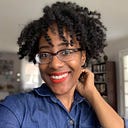Member-only story
How Instagram Changed Black Women’s Relationships With Stylists
Hairstylists have found a new way to market their businesses, but it has come at a price
 On any given Saturday, you will find Black women busy ministering to each other, congregating in spaces akin to church. We do not leave the same way we came in. Standing beside bowls of water to baptize weary heads, dipping into fragrant oil to anoint our temples, Black beauticians offer a safe space for Black women’s vulnerability.
On any given Saturday, you will find Black women busy ministering to each other, congregating in spaces akin to church. We do not leave the same way we came in. Standing beside bowls of water to baptize weary heads, dipping into fragrant oil to anoint our temples, Black beauticians offer a safe space for Black women’s vulnerability.
Hairstylists often occupy roles of confidantes and are the arbiters of cultural style in their clients’ lives. Black women traditionally found stylists via fliers, word of mouth, at salons, or by approaching a well-styled woman who turned out to be a beautician. Now the beauty shop has become decentralized from its place as the hub to find a hairstylist, with the advent of geotagging on social media platforms like Instagram, where Black beauticians have flocked to advertise their talents and services.
Instagram now functions as Black women’s digital “front stoop” for beauty culture. Though during the budding natural hair movement in the early 2000s, online spaces allowed you to “tell your story and [have] people come around and affirm you,” says Tiffany M. Gill, associate professor of Africana studies and history…

